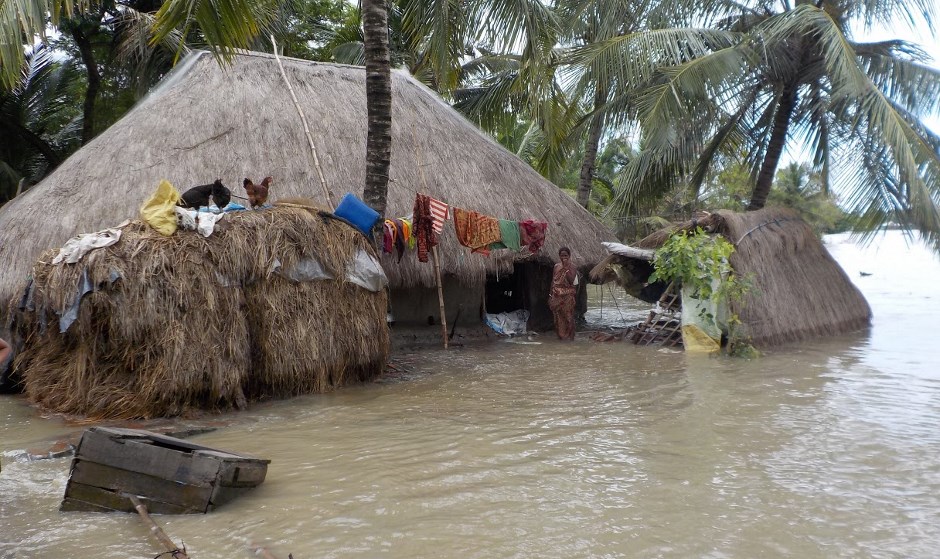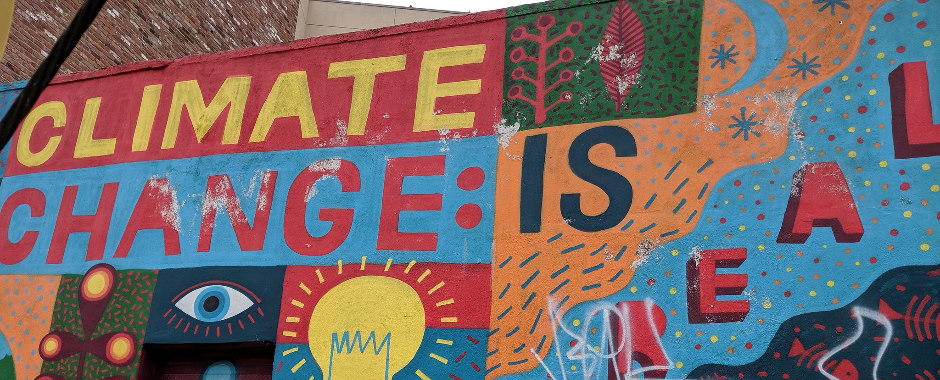This is the first in a series of four blog posts on the climate by STEPS co-director Andy Stirling, under the heading: ‘Controlling a stable planetary climate – or caring for a complex changing Earth?’
What’s in a name? Often, not a lot. Never a whole story. But sometimes (if looked for), there are clues about important forces that might otherwise lie hidden. So, let’s ask this question of arguably the world’s worst environmental problem. Why is this so routinely referred to as ‘climate change’?
It’s not as if there aren’t plenty of alternative names. Much past wrangling over (and manipulation of) terms leaves many vocabularies scattered across different colloquial pockets of debate – like ‘global warming’; ‘greenhouse effect’, ‘radiative forcing’; ‘global heating’; ‘global weirding’; ‘climate emergency’; ‘climate chaos’; ‘climate catastrophe’; or ‘climate apocalypse’. But for several decades now, ‘climate change’ has been the overwhelmingly dominant label – especially at the highest levels of global policy making.
What is it about this term that makes it so preferred? Again, there are many theories and critiques. Blind historical chance probably plays a role. But among the diverse threads in this conundrum, there is one I want to focus on here. Why emphasise the word ‘change’? I think this points to a crucial reason why efforts so far to avert this calamity, have proven so strikingly unsuccessful.
‘Change’ is often accused of being far too mild a term for the threatened cataclysm. On the other hand, there is sadly no shortage of self-indulgent contrarians or more shadily-motivated denialists, who cynically query why the particular ‘changes’ involved should necessarily be thought to be so bad.
On this, we need spend little time. The impacts on existing societies, economies and livelihoods look set to be among the worst disasters ever to befall humanity. Crucially, it is not just a steady overall direction of change that matters, but prospects of tipping points and massive uncertain fluctuations. Present forms of globalising industrial modernity are far too brittle to withstand the shocks and stresses without collapse. And the resulting impacts are always worst for those who are already subject to longstanding, but avoidable and no less indefensible inequalities, injustices, oppressions and vulnerabilities.
So why choose a dominant framing that feeds such spurious distractions? Why offer lazy and vacuous criticism such an easy target? That the Earth’s climate is naturally changing is, after all – especially outside “modern times” – an undeniable norm. Albeit usually on different timescales (but sometimes very fast), climate has oscillated radically throughout the history of humanity and before. Indeed, this changeability may have been a key shaper of distinctively human adaptations and adaptiveness. Whilst threats are existential for particular species, for the Earth itself and life in the widest sense, a naturally changing climate is as much a driver of vibrancy and diversity as it is a threat.
The more serious climate threats are recognised to be, the more important it is to think this through. The reason a changing climate now presents such a truly calamitous prospect for people around the world, is that it is difficult to imagine contemporary economies and infrastructures – with all that depends on them – surviving such radical and uncertain disruption. Combined with other human propensities under pressure and fear, like exclusion, appropriation, exploitation, violence – and, in this century, nuclear or biological war – it is likely that at least a large proportion of humanity is at risk. In a world of nine billion people, the misery this means goes far beyond mere numbers.

And for other forms of life and the Earth itself, what is crucial is that this human catastrophe mixes with additional pressures. The same industrial modernity that is disrupting the climate, is at the same time perpetrating a series of other devastating assaults on Nature: on land, water, air and global biodiversity. These massive impacts mean species and ecosystems are no longer able to move in ways that have absorbed so many radical changes of climate in the past.
So, the problem is not merely that the climate is ‘changing’. Times beyond count, both people in many different kinds of societies, as well as Earthly life more widely over the aeons, have dealt with similar shifts and rebounded with renewed vigour. Life is now more fragile and the problem more complex.
The real reasons why climate disruption is such a huge issue, then, are: first, the shift is not ‘natural’, but caused by specific (avoidable) kinds of human society that are also devastating the Earth in other ways; second, that these same societies are so unequal and brittle that they cannot themselves cope with it; third, that the violence and mass destruction with which these life-eroding societies will likely respond among themselves to the natural backlash they are provoking, poses even more apocalyptic threats.
So, in each of these ways, the threats lie more in characteristics of the responsible cultures than in change itself. Why then does the routine naming of this challenge highlight a general property of change in the planet, rather than these more directly-relevant causal factors in our own politics?
This skewed view focuses most explicitly on a part of the problem that is furthest from the real social, cultural and economic drivers. It is as if the challenge were technical, rather than political. It can seem like all that’s needed is just to stop the ‘change’ – and let politics otherwise carry on as normal.
And even in more specialised debates – where it is (to be fair) sometimes specified that the climate change of concern is human-caused or ‘anthropogenic’ (rather than ‘natural’) – a similar problem arises. This technical adjective implicates humans in general, rather than particular kinds of privilege, economy or society.
Yet it is not ‘humans in general’ who cause the problem. Most human societies that ever existed did not inflict such damage. Nor do most people now. If this were an unavoidable human trait, then what hope would there be for transformation? Again, even the more technical nuance of the term ‘anthropogenic’ takes the focus away from the particular – political, industrial, cultural and technological – structures and interests that are actually causing the problem.
And this fixation with consequences, more than driving causes, is not just evident in the names people use. It pervades the whole basis for global pressure for action, especially at higher levels of government policy making, international diplomacy and environmentalism. Here again, the dominant attempted mode of intervention is to “take control” of the climate by “stabilizing” average global temperature. In growing desperation, the main focus has been on “the human imperative of stabilizing global climate change” with the iconically double-digit precision of 1.5°C. Or, in desperation, there is the fall-back of “staying below”, or “well below”, the equally singular numerical backstop of “2 degrees”.

So, this focus on consequences more than causes is not just a matter of language, but an extremely serious problem with the wider politics. And there are clear concrete alternatives. Why not, for instance (as here), call the problem ‘climate disruption’? Unlike the contending names mentioned above, this fixates less on the variously-styled ‘effects’ and more on their drivers. It highlights that it is not change in itself that is the problem, but massive disruption of deeper natural processes of change. By targeting causes (in ‘disruption’) rather than consequences (in ‘change’), this offers a far more clear and direct focus on necessary action.
Again, the point is not that shifting terminology will somehow solve the problem. But even falling short of full prescriptions, words can help in diagnosis. And if diagnosis errs so badly, what hope is there for prescriptions?
Of course, in worldwide climate movements, there is no shortage of clear recognition for the underlying drivers, of energetic ‘solutions’, and of creative approaches to campaigning. But (as the following posts in this series will explore), it makes a big difference whether these are pursued as technical means (in fearful, technocratic desperation in relation to consequences); or as political ends in and of themselves (in more caring, values-driven hope for alternative ways of living and working).
The vital point here, is that if the overall goal is a seeming engineering challenge (of ‘stabilizing planetary climate’), then the crucial social mess of politics is effectively airbrushed out. Imperatives for action in energy, agriculture, transport and consumption can be treated as secondary, as substitutable for each other, as driven more by expertise than by values or democratic struggle. By framing the problem as ‘climate change’, a primary focus is lost on the main problem of mass-industrial interference in natural processes of change.
This risks reinforcing some powerful opposing forces. Human manipulation of the planet can even start to appear as a cure, rather than the illness.
Given this confusion, it is perhaps hardly surprising that efforts to avert climate disruption are failing so badly. For an environment movement that has seen such remarkable and relatively rapid success in the past across so many other issues, this failure is shocking.
So why might this be? What can be done about it? In the rest of this series, I will take a closer look at these crucial questions.
Other posts in this series
Does the delusion of ‘climate control’ do more harm than good to climate disruption? Andy Stirling, 9 July 2020
Betraying the climate? Has environmentalism succumbed to a modernity it hitherto resisted? Andy Stirling, 14 July 2020
Thriving in an ever-changing world: from technocratic control to emancipatory care? Andy Stirling, 16 July 2020
Our theme for 2020: Natures
 Nature is all around us, but there are many ways of seeing different kinds of ‘natures’, and many efforts to involve it in forms of control or domination.
Nature is all around us, but there are many ways of seeing different kinds of ‘natures’, and many efforts to involve it in forms of control or domination.
How is talk of crisis shaping nature and people’s views of it? How can colonial forms of knowledge, technology and power be challenged, and what might it mean to ‘decolonize’ the study of environmental change? What do alternatives look like, and how can we explore, nurture, imagine and live the relationships we might want for the future?
Find out more about our theme for 2020 on our Natures theme page.

I probably should wait until the final blog in the 4-part series appears in case I’ve missed what Andy is building up to.
But, as each blog so far has been suggestive in its own terms, it might be useful for readers to summarize what are their takeaways from his points—if only as a optic to (re)thinking our own ideas about the topics.
My initial takeaway is twofold. The labels we give to phenomena matter because they point us into different directions; and the directions matter because some are less helpful than others. That may seem obvious, but it isn’t once I draw out what I take to be the implication: It means not only is there no single, overarching helpful intervention, there are many unhelpful ones (including when “the opposite of good turns out to have been good intentions”).
What then is “helpful” and “unhelpful”? For someone who has focused a whole career on the priority of addressing consequences of policies and management, that focus on consequences takes us only so far, and for the problems discussed in above blog, that focus does not go far enough by way of helping matters, i.e., we also need to get back to clarity about the causes at work.
Which indeed is a core topic of his next blog!
https://mess-and-reliability.blog